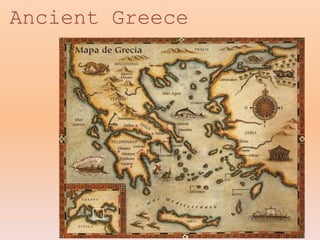
Unit 8: Ancient Greece
- 2. Archaic Classical Hellenistic Ancient Greece Where? When? What that we are going to learn about Ancient Greece Economy Wars (Termopilas, Salamina…) Politics (origin of democracy) Alexander the Great Art Mythology
- 3. 1) Draw a timeline with the three different phases of Ancient Greece. Archaic Period 800 BC Classical Period 490 BC Hellenistic Period 336 BC 30 BC In the Iron Age First Olympic Games Importance of the Poleis Greek Colonisation First Greco-Persian War (490 BC) 2nd Greco-Persian War (480 BC) Peloponnesian War (431 BC - 404) Alexander the Great rules in Greece (336 BC) Death of Alexander the Great (323 BC) Conquest of all Greece, Egypt, Middle East, Mesopotamia, Persia and India Beginning of the Hellenistic kingdoms (323 BC)
- 4. 2) Where did the Greek civilisation develop? The Greek civilisation developed in the Balkan peninsula, the islands of the Aegean sea and in Asia Minor (western coast of the Anatolian Peninsula). Archaic Period
- 6. 3) What were the Poleis? The Poleis (plural) were independent city-states that shared a common language and religion. Note: Polis (singular), Poleis (plural)
- 7. 4) How did the Greeks make a living? The Greeks worked in agriculture (olives, wheat and vineyards), livestock farming and fishing. They were also traders.
- 8. 5) Why did Greeks migrate? During the archaic period Greeks migrated because of the scarcity of land and the poor living conditions of many peasants. 6) Where did the Greeks found colonies? Greeks founded colonies in: • Southern Italy and Sicily (Magna Grecia) • Massalia (Marsella) in France • Iberian Peninsula (Rhode Emporiae, Hemeroscopium and Menace) • Coastal areas of the Black Sea. 7)What did the Greeks introduce in the colonies? Greeks introduced: • Potter's wheel • Iron work • Currency (money) • Alphabet and writing • Vineyards and olives
- 9. Map of Greek Colonies
- 10. Classical Period 8) Explain the Greco-Persian Wars. The Greco-Persian Wars were in 490 B.C. (beginning of the 5th century), the opponents were the Persians (Maedis) and the Greeks. The reason was that the Persians wanted to invade and control the Greeks. Finally the Greeks won the conflict in the battles of Thermopylae and Salamis (480 BC) Extra Information Thanks to the Greco-Persian Wars many citizens of the Greek Poleis are going to ask for more political rights and this is how democracy started. The Greco-Persian Wars also mark the beginning of the Classical Period.
- 13. 9) Where and when did democracy develop? Democracy developed in Athens in the 5th century B.C. 10) What was Democracy and when did it appear? Democracy was a political system where only citizens could vote and it appeared in the classical period in the 5th century B.C. 11) Who could and who couldn’t participate in the Athenian democracy? Citizens could participate in politics (male citizens) and women, metics (foreigners) and slaves couldn't participate in politics.
- 14. How was Democracy in Athens
- 16. 12) When was the Athens's Golden Age? Athens Golden Age was in the 5th century B.C. Extra Information During the Athens's Golden Age we can find great personalities such as Pericles (politician), Socrates, Plato and Aristotle (philosophers), sculptors such as Phidias, Myron, Polykleitos and theatre writers such as Aeschylus (Esquilo), Sophocles (Sófocles), Euripides, Aristophanes (Aristófanes). Pericles Plato Sophocles
- 17. 13) Explain the Peloponnesian War. The Peloponnesian war took place between 430 to 404 B.C. (end of the 5th century). The opponents were Sparta and Athens. The reason was the rivalry between Sparta and Athens because they wanted to control all Greece. The Spartans finally won the conflict but all Greece was destroyed. Extra Information The Peloponnesian war will mean the end of the Classical period. After this wars a new region will control all Greece (Macedonia) and this will be the end of the independent poleis and the beginning of the Hellenistic period.
- 19. Hellenistic Period 14) Who was Alexander the Great and why was he so famous? He was the son of Philip II, king of Macedonia. He became king when he was 20 years old and he created an empire from Greece to Asia. Extra Information Did you know that the personal teacher of Alexander was the famous philosopher Aristotle.
- 20. 15) What great empire did he confront and defeat? He confronted and defeated the Persian Empire. 16) What territories did Alexander control? The territories that Alexander controlled were Macedonia, Greece, Asia Minor, Egypt, Mesopotamia, Persia and Indus Valley.
- 21. 17) What happened when Alexander died? When Alexander the Great died the Empire was divided into different kingdoms, called the Hellenistic kingdoms.
- 22. Extra Information During the Hellenistic period there was an incredible promotion of Arts and Science. We have incredible scientists such as Euclid (Euclides), Archimedes, Hippocrates, Hypatia… And there were great advances in mathematics, astronomy, medicine, biology… An example of these advances is the Antikythera mechanism, an incredible machine whose functions and mysteries have been discovered recently. https://www.youtube.com/watch?v=WN8uUl4rbkE (You have more videos about it in the webpage)
- 23. 18) What are the three classical orders of classical Greek architecture? (Make a drawing of each one) • The three classical orders are Doric, Ionic and Corinthian Greek Art
- 24. 19) What are the three periods of Greek sculpture? • Archaic Period: The figures were very static. Lack of movement and feelings • Classical Period: 5th and 4th centuries B.C. There is movement, but in a balanced way, without tensions. The face shows serenity. • Hellenistic Period: (4th – 1st century B.C.). There is an exaggerated movement and faces show dramatic emotions. Extra Information Did you know that Greek sculptures and buildings were painted with bright colours?
- 25. Archaic Period Classical Period
- 26. Hellenistic Period, Laocoon and his sons